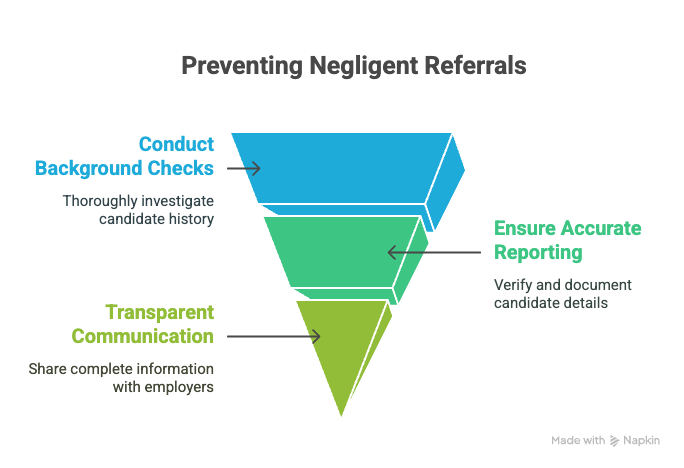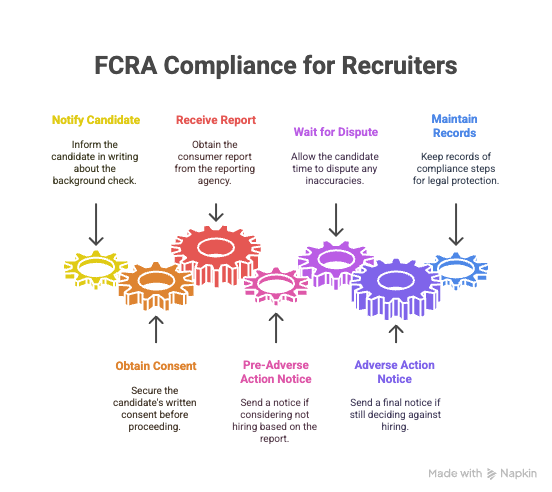In the staffing world, providing references for employees is a common, albeit crucial task. When done correctly, references can help individuals secure jobs and aid employers in finding suitable candidates. However, when handled improperly, reference might backfire, leading to what is known as a "negligent referral." This occurs when an agency unknowingly or knowingly provides misleading or false information about an employee, potentially leading to substantial legal and financial consequences. This guide outlines how staffing agencies can protect themselves from negligent referrals, ensuring they maintain compliance and uphold their professional reputation.
Key Takeaways
- Negligent referrals happen when inaccurate or incomplete candidate information misleads employers, often causing legal and financial troubles for staffing agencies.
- Conduct comprehensive background checks to minimize the risk of endorsing candidates with undisclosed past issues.
- Maintain detailed documentation of references and ensure transparency to protect your agency against disputes.
- Implement standardized policies for providing references, ensuring consistency and accuracy in communication.
- Stay informed about legal requirements like the FCRA to maintain compliance and avoid possible lawsuits.
Introduction
In the staffing industry, there's a trust factor that flows both ways. Candidates trust agencies to accurately present their skills and experiences. Employers rely on those agencies to provide truthful references. But mistakes happen, and when agencies slip up, they risk what's called a negligent referral. Imagine endorsing a candidate without mentioning a significant performance issue. This oversight could lead to employment issues down the line and even land you in legal hot water.
Why should this matter to you? As someone running or working within a staffing agency, you must be aware of the risks a negligent referral poses. Ignoring these can result in lawsuits, financial losses, and a damaged reputation.
Our focus here is on how you can guard against negligent referrals. Weâll explore strategies ranging from tightening background checks to adopting solid reference policies. Knowing how to navigate this landscape will help protect your agency from unnecessary liabilities. Letâs dive into the essentials so you can shield your agency effectively.
Understanding Negligent Referral
Negligent referral arises when an agency provides false or misleading details about a candidate. This can happen if incomplete or inaccurate information leads to another organization making a poor hiring decision. You might find yourself facing legal or financial repercussions if the misinformation causes harm, like hiring someone who proves unsuitable or even dangerous for a position.

At its heart, negligent referral is about accountability. When you offer referrals, you are vouching for someoneâs work ethic, qualifications, and character. A misstep in any of these areas can have consequences not just for your agency, but for employers relying on your judgment.
Imagine endorsing a candidate whose past offenses you did not fully disclose, leading to workplace incidents. This scenario isnât far-fetched and could land your agency in court. Besides legal fees, you risk damaging professional relationships and your agency's reputation.
Understanding these risks is crucial. It reminds you to take due diligence seriously. In today's interconnected hiring landscape, protecting your agency from negligent referral starts with honesty and thoroughness. Engaging in comprehensive background checks and clear documentation is your first line of defense. What steps are you taking to ensure accuracy in referrals? Consider this carefully, as your agencyâs integrity could depend on it.
Common Scenarios Leading to Negligent Referrals
Negligent referrals often stem from several common issues that agencies face. One major risk is inadequate background checks. Suppose an agency skips or skimps on checking a candidate's history. This can lead to missing critical past employment issues or legal incidents. For instance, not verifying a candidate's reason for leaving previous jobs can mislead potential employers, setting the stage for problems down the line.
Another pitfall is issuing overly positive or inaccurate endorsements. It can be tempting to paint candidates in a positive light to help them land a job. But without a factual basis, this can create unrealistic expectations for the hiring employer. For example, exaggerating a candidate's skills or experience can result in a mismatch once they're on the job, affecting both employer satisfaction and the agency's credibility.
Lastly, withholding critical information is a slippery slope. Suppose an agency knows about a candidate's significant performance issues but doesn't disclose them. This omission could lead to negligent referral claims if the new employer faces similar issues. Itâs crucial to balance confidentiality with the responsibility to provide honest references.
Negligent referrals can be a costly mistake. Addressing these common scenarios forthrightly can save your agency trouble and maintain your reputation in the staffing industry.
Strategies for Prevention
Negligent referrals can put your staffing agency at risk, but with the right strategies, you can safeguard your operations. Start by implementing thorough background checks. This means going beyond a simple resume review. Verify employment history, check for any criminal records, and confirm qualifications. Consistency here is crucial. Use the same level of scrutiny for every candidate to ensure fairness and compliance.
Documentation is also key. Keep detailed records of all referrals given. Document conversations and notes to create a paper trail that supports your assessments. This transparency can protect you if any questions arise later.
Establish standardized reference policies. Create clear, written guidelines that outline how references should be handled. These policies should specify what information can be shared and who within the company is authorized to speak on behalf of the agency.
Insurance is another layer of protection. Consider policies that cover employment practice liability, which can shield your agency from claims of negligent referral. This acts as a financial buffer should any disputes escalate into legal action.
By implementing these strategies, you can minimize risk and maintain your agency's professional integrity. Are your current practices enough to protect against potential negligent referrals?
Ensuring Compliance: FCRA for Recruiters
The Fair Credit Reporting Act (FCRA) sets specific requirements for recruiters who use background checks in their hiring decisions. The FCRA aims to ensure accuracy, fairness, and privacy of information in consumer reporting. As a recruiter, understanding the FCRA's demands is crucial to avoid legal troubles.

First, you must notify candidates in writing if you plan to obtain a consumer report. This notification should be clear, conspicuous, and separate from other documents. You also need to get the candidate's written consent before proceeding. This simple step often gets overlooked, but skipping it can lead to costly compliance issues.
Once you receive the report, use it responsibly. If you decide not to hire someone based on their report, you're required by the FCRA to provide a "pre-adverse action" notice. This notice should include a copy of the consumer report and a summary of the candidate's rights under the FCRA.
Next, give the candidate time to dispute any inaccuracies. The law doesn't specify how long to wait, but a reasonable period is generally five business days. If you still decide against hiring after this period, send an "adverse action" notice. This must include the contact details of the consumer reporting agency that furnished the report, but remind the candidate the agency didn't make the hiring decision.
Staying compliant involves keeping records to show your adherence to these steps. Not only does this protect your agency from legal liabilities, but it also builds trust with candidates by showing respect for their information.
These actions might seem cumbersome, but they safeguard your agency's operations. Are you ensuring your background check processes comply with the FCRA? Taking these preventative steps can save you from potential headaches in the future.
Building a Strong Defense with Staffing Agency Insurance
Insurance plays a crucial role in shielding staffing agencies from the fallout of negligent referral claims. These policies act as a buffer, protecting against financial losses that arise from legal battles.
Errors and Omissions (E&O) insurance is essential. It covers legal costs and settlements if a client claims that a poor referral caused them damage. Consider a situation where a candidate, once hired, fails to meet job requirements, and the client blames the agency's glowing recommendation. E&O insurance can mitigate the financial blow.
Another option is General Liability insurance. While it doesn't cover professional mistakes, it offers protection against third-party claims, such as defamation, that might arise during reference checks.
Workers' Compensation insurance is another tool to consider. Although it is traditionally more aligned with workplace injuries, it indirectly supports the agency by proving a commitment to employee well-being, which can be valuable in legal scenarios.
Reassessing insurance needs regularly is crucial to maintaining adequate coverage. Laws and regulations change, and so do the agency's risks. Review policies annually to ensure they still align with current conditions and agency operations.
Insurance is not the sole remedy but a substantial line of defense. Use it wisely, and combine it with comprehensive background checks and standardized procedures to best protect your agency.
Leveraging Internal and External Resources
Utilizing both internal and external resources can bolster your agency's defense against negligent referrals. Start with in-house expertise. Encourage your team to stay current with industry standards and conduct regular training sessions on best practices in employment background checks. Create a culture where employees feel confident in identifying potential red flags when handling references.
Consider setting up a resource library with materials and guidelines accessible to all staff members. This can include documents on compliance requirements, checklists for reference checks, and updates on legal precedents. Having a go-to reference can improve consistency and accuracy in your agency's referral process.
External resources also play a crucial role. Networking with other professionals in the industry can provide insights and share experiences to learn from othersâ successes and missteps. Explore and maintain relations with legal experts who specialize in employment law to ensure your agency practices align with current legal standards.
Additionally, reputable online resources offer valuable information. The Department of Labor is a trusted source for guidelines and updates on hiring practices. Regularly visiting such websites can keep your agency informed about changes in laws and regulations, further safeguarding against potential negligent referral claims.
Case Studies and Real-World Examples
Consider a staffing agency that vouched for a candidate without confirming their past employment claims. The agency relied solely on the candidate's resume, assuming it was accurate. When the candidate was hired, discrepancies emerged, leading to legal action against the agency. This scenario highlights the risk of trusting unverified information.
Another situation involved an agency providing an overly glowing endorsement without knowing the candidate's previous misconduct. The candidate, once hired, repeated similar behavior, causing the employer to seek damages from the agency. This case underscores the peril of giving references without due diligence.
Take, for example, a scenario where critical details about a candidateâs past performance were omitted. A clever application omitted such information, resulting in another subpar placement and subsequent fallout. This instance illustrates why withholding information can be just as damaging as providing false details.
These stories emphasize the importance of thorough checks and honest disclosures. Agencies successfully avoid these pitfalls by implementing stringent verification processes and sticking to standardized reference policies. Such measures not only help in reducing risks but also in building trust with clients.
Learning from these examples, ask yourself: What internal checks can you improve to prevent negligent referrals? How can your agency ensure each reference is both honest and fair? By pondering these questions, you can take critical steps toward safeguarding your agency's reputation.
Conclusion
Protecting your staffing agency from negligent referrals is a multifaceted endeavor. By implementing strategic measures, you can significantly reduce the risk of legal and financial repercussions.
Start by investing in thorough background checks. These screenings can prevent misinformation from reaching potential employers. This diligence builds trust and reduces liability.
Documentation is another pillar of protection. Maintain clear records of endorsements and the information shared. This transparency ensures consistency and supports your agency's claims if disputes arise.
Adopt standardized reference policies. Develop guidelines that detail how references are provided, ensuring all staff follow a consistent approach. This minimizes the chance of subjective or inaccurate information slipping through.
Consider relevant insurance options. Professional liability insurance, for instance, can provide a layer of protection against claims. It's an investment in your agency's safety.
Finally, be proactive. Equip your agency with the tools and knowledge to avoid negligent referrals. This effort not only safeguards your reputation but also strengthens your standing in the staffing industry. For ongoing guidance and resources, continue to explore best practices and industry standards.
Frequently Asked Questions (FAQs)
Whatâs the difference between negligent referral and negligent hiring?
Negligent referral occurs when a past employer fails to disclose relevant information about a former employee's incompetence or misconduct when providing a reference. Negligent hiring happens when a company hires someone they should have known was unfit for the role. Both situations can lead to legal issues if the employee causes harm.
Can a staffing agency be sued for a bad hire?
Yes, a staffing agency can face legal action if they negligently place a candidate who is unfit or unsafe for a position. This is particularly true if the agency failed to perform adequate background checks.
What background checks are legally required for staffing agencies?
The specific checks depend on the industry and role. Common checks include criminal history, verification of identity, and employment history. Some roles may require credit checks or motor vehicle records if relevant to job duties.
How do staffing agencies verify past employment?
Staffing agencies often verify past employment by contacting previous employers directly. They may confirm job titles, dates of employment, and sometimes reasons for leaving. This ensures candidates have the experience they claim.
What insurance protects against negligent referral claims?
Employment Practices Liability Insurance (EPLI) can protect companies against claims of negligent referral, as well as other employment-related issues like discrimination or wrongful termination.
What are staffing agencies obligated to disclose to potential employers?
Staffing agencies must disclose any relevant information about a candidate that could impact their job performance or safety. Transparency is crucial to avoid negligent referral claims.
What role does a candidateâs consent play in background checks?
Candidate consent is essential for conducting background checks. Agencies need explicit permission from candidates to access and share their personal information.
Are staffing agencies responsible for ongoing monitoring of placed candidates?
Typically, staffing agencies are responsible for initial placement. However, ongoing monitoring often falls to the employer unless specific terms are agreed upon in the staffing contract.
What actions can a company take if they discover a hire was unfit after placement?
If a company finds a hire unsuitable, they should coordinate with the staffing agency to address the issue. This might involve replacing the candidate or pursuing legal remedies if negligence on the agencyâs part is evident.
Definitions
Negligent Referral
A negligent referral happens when an agency provides false, misleading, or incomplete information about a candidate. This might include exaggerating strengths, omitting critical performance issues, or failing to validate employment history. If the hiring employer relies on this referral and suffers harm as a result, the agency may face legal or financial consequences.
Background Checks
A background check is the process of verifying information provided by a job candidate. This includes employment history, education, criminal records, and other relevant details. Agencies conduct these checks to confirm facts before making a referral. Inconsistent or skipped checks can lead to errors that damage trust or trigger lawsuits.
Reference Policy
A reference policy is a written guideline that outlines how your agency provides information about candidates. It sets rules for what can be shared, who is authorized to speak, and how records should be kept. A strong policy promotes consistency, reduces risk, and supports legal compliance.
Fair Credit Reporting Act (FCRA)
The FCRA is a federal law that regulates how recruiters handle consumer reports like background checks. Agencies must notify candidates in writing, get their permission, and follow specific steps if negative information affects hiring decisions. Failure to comply can lead to fines or legal challenges.
Errors and Omissions (E&O) Insurance
E&O insurance protects staffing agencies from the financial impact of claims when a referral results in client harm. For example, if your agency overlooks a candidateâs misconduct and the client sues, E&O insurance can cover legal fees and damages. It acts as a financial safeguard in high-risk hiring decisions.
References
- SHRM: Negligent Hiring Risk Less Than Employers Believe
- GCheck: Risks of Placing Unscreeened Candidates
- American Staffing Association: Staffing Industry Statistics
- Federal Reserve Bank of New York: Do Informal Referrals Lead to Better Matches?

GCheck Editorial Team
Meet the GCheck Editorial Team, your trusted source for insightful and up-to-date information in the world of employment background checks. Committed to delivering the latest trends, best practices, and industry insights, our team is dedicated to keeping you informed.
With a passion for ensuring accuracy, compliance, and efficiency in background screening, we are your go-to experts in the field. Stay tuned for our comprehensive articles, guides, and analysis, designed to empower businesses and individuals with the knowledge they need to make informed decisions.
At GCheck, we're here to guide you through the complexities of background checks, every step of the way.





